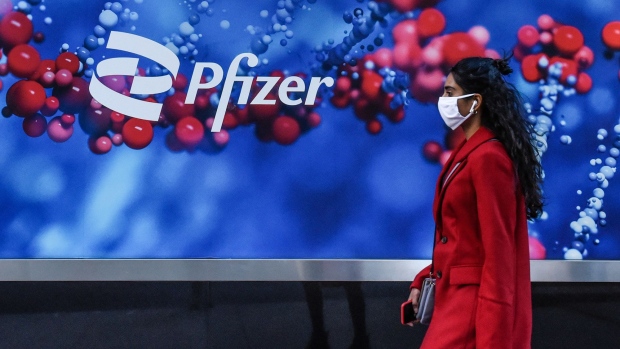Feb 28, 2023
Pfizer’s RSV Vaccine Wins US Panel’s Backing for Safety in Older People
, Bloomberg News

(Bloomberg) -- Pfizer Inc.’s vaccine for respiratory syncytial virus received backing from a panel of US advisers for use in people 60 and older, pushing the company to the forefront once again for immunization against a dangerous respiratory illness.
Members of the panel that advises the Food and Drug Administration voted 7-4 with one abstention to recommend the vaccine as both safe and effective in preventing RSV. Still, several who endorsed the shots also raised concerns about the lack of data on hospitalizations and the highest-risk patients, as well as two incidents of a rare disorder among those who were vaccinated.
As it did with its messenger RNA Covid-19 vaccine, Pfizer gained the coveted spot of being first to pass a key barrier to the US market for a lung illness that affects thousand of people each year. Pfizer has been vying with the UK’s GSK Plc over what is estimated to become a $10 billion RSV market. GSK will face its own advisory committee hearing on Wednesday for what infectious disease specialists call the last big respiratory virus without a vaccine.
Pfizer shares rose 0.8% in pre-market trading.
People with weak immune systems are particularly at risk for RSV along with older people, with 177,000 hospitalizations and 14,000 deaths recorded among US elderly each year from the disease, according to one 2005 study.
Both Pfizer and GSK have produced strong data showing the vaccines are effective in adults 60 and older, although there’s relatively little evidence on how much the vaccines reduce hospitalizations from RSV.
Several committee members raised safety questions because of two cases of a rare potential side effect among close to 20,000 trial participants who received the vaccine, which the FDA called an important potential risk before the hearing. The rare disorder, Guillain-Barre syndrome, occurs when the body’s immune system attacks the nerves, sometimes causing paralysis that is usually temporary. The syndrome has been associated with vaccination in rare cases.
“One case is a red flag, two cases is very concerning, and it’s concerning to me that Pfizer doesn’t think that there are any safety concerns,” said panel member Marie Griffin, a Vanderbilt University health policy and medicine professor.
Confounding Factors
Pfizer responded that there were confounding factors such as prior medical events that occurred in the same two patients and that the older population has higher incidences of the syndrome. The company said it would conduct a study after the drug reaches the market and is in touch with the FDA on designing it.
Other committee members said data supporting the vaccine were scant. Hana El Sahly, a Baylor College of Medicine virologist who serves as committee chair, questioned why Pfizer didn’t wait until it had data for a second RSV season before applying for regulatory approval. Pfizer officials responded that data is coming shortly. Some members even requested that the vote be delayed until more data became available.
The RSV vaccine market for adults will be worth up to $10 billion by 2032, according to projections by Bloomberg Intelligence. Pfizer is also facing off with collaborators Sanofi and AstraZeneca Plc to develop prevention for dangerous RSV infections in newborns, a market that could reach $1.5 billion.
Once the FDA decides whether to go along with the advisory committee’s vote, the Centers for Disease Control and Prevention’s Advisory Committee on Immunization Practices will issue recommendations that could have a big impact on how often the RSV vaccines are used—and how much revenue the two companies ultimately generate from them.
(Updates with pre-market trading in fourth paragraph)
©2023 Bloomberg L.P.


